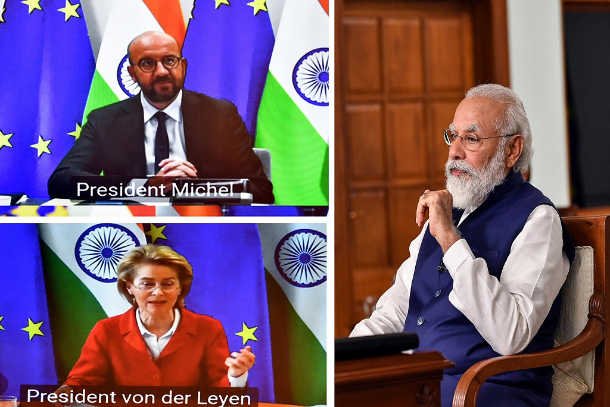
Indian prime minister, Narendra Modi, right, attends the India-EU Virtual Summit 2020 with the president of the European Council, Charles Michel, top left, and European Commission president, Ursula von der Leyen, in New Delhi. (Photo: AP)
The European Union has once again expressed concerns over a controversial citizenship law in India that allegedly discriminates against Muslims, but said it had faith the country's top court would address them.
At a virtual summit with Indian Prime Minister Narendra Modi on July 15, European Union leaders expressed concern that the Citizenship Amendment Act (CAA) passed last December "contradicted" India’s own Constitution, which guarantees the right to equality for every person. "I would like to say that we trust Indian institutions. We understand the Supreme Court will have a role to play to assess this legislation,” said Charles Michel, president of the European Council, at a virtual press briefing (from Brussels) after the India-EU Virtual Summit 2020. "You know that in the European Parliament this was an important topic, and we raised this issue in our talks,” he said referring to the new law. The controversial law passed in a parliament dominated by Modi’s pro-Hindu Bharatiya Janata Party (BJP), triggered nationwide protests and also sharp criticism from government detractors. The law aims to provide citizenship to migrants from Afghanistan, Bangladesh and Pakistan who entered India on or before Dec. 31, 2014. But it restricts eligibility to people belonging to six religious groups — Hindus, Sikhs, Buddhists, Jains, Parsis and Christians — and excludes Muslims. An official of India’s Ministry of External Affairs confirmed that the issue was brought up by the EU during the virtual summit. Indian authorities feel the EU leaders are also attempting to strike a balance on the issue by "expressing their faith" in Indian institutions (the Supreme Court in this case) to address the grievances. However, the Indian government has insisted the citizenship law is not discriminatory. BJP leaders and government officials maintain that the aim of the CAA is to ensure that citizenship is granted to "persecuted religious minorities, including Christians and Hindus" coming from the three neighboring countries. Socialist leader Dharmendra Yadav agreed with the EU criticism. "The European Union has done its homework, the law not only discriminates against Muslims from the three countries, it specifically excludes Rohingya Muslims from Myanmar,” he told UCA News. Such a law violates international norms as Amnesty International and the United Nations have described Rohingyas as the world’s most persecuted minority, he said.Critics say the law shows the BJP’s historical animosity toward Muslims and their support for the ideology of making India a Hindu-only nation. The law has prompted detractors of the BJP both in India and abroad to speak out.


